Jesus as New Jeremiah and Tabernacle: Reflections on Passion Sunday
by Borderland Nathan
Jeremiah was a great prophet that was known for being a suffering prophet, as well as directly facing the Jews; preaching the future destruction of the Temple for the sins of Judah. I should emphasize, that when I refer to the “Jews” it is not the entire people of the Old Covenant. Israel consisted of twelve tribes, and after King David united the twelve tribes briefly under his rule, they split into two kingdoms; in the North and in the South. The ten tribes of the North were conquered by Assyria due to their idolatry, and were exiled. They were then called the “lost tribes,” being exiled or assimilated by a pagan nation. The tribes of Benjamin and Judah remained in and around Jerusalem in the region of Judah; Judea in Greek. They were collectively referred to as the Judeans, since the most prominent tribe was usually mentioned for the whole collective. In Greek this was Ἰουδαῖοι, and in English, the Jews. Jeremiah warned Jerusalem and the Jews that God would punish them and destroy the temple, and this happened during the Babylonian exile.
Being a prophet was rough.
Jeremiah 1:1-19:
1 The words of Jeremiah, the son of Hilki′ah, of the priests who were in An′athoth in the land of Benjamin, 2 to whom the word of the Lord came in the days of Josi′ah the son of Amon, king of Judah, in the thirteenth year of his reign. 3 It came also in the days of Jehoi′akim the son of Josi′ah, king of Judah, and until the end of the eleventh year of Zedeki′ah, the son of Josi′ah, king of Judah, until the captivity of Jerusalem in the fifth month.
4 Now the word of the Lord came to me saying,
5 “Before I formed you in the womb I knew you,
and before you were born I consecrated you;
I appointed you a prophet to the nations.”
6 Then I said, “Ah, Lord God! Behold, I do not know how to speak, for I am only a youth.” 7 But the Lord said to me,
“Do not say, ‘I am only a youth’;
for to all to whom I send you you shall go,
and whatever I command you you shall speak.
8 Be not afraid of them,
for I am with you to deliver you,
says the Lord.”
9 Then the Lord put forth his hand and touched my mouth; and the Lord said to me,
“Behold, I have put my words in your mouth.
10 See, I have set you this day over nations and over kingdoms,
to pluck up and to break down,
to destroy and to overthrow,
to build and to plant.”
11 And the word of the Lord came to me, saying, “Jeremiah, what do you see?” And I said, “I see a rod of almond.” 12 Then the Lord said to me, “You have seen well, for I am watching over my word to perform it.”
13 The word of the Lord came to me a second time, saying, “What do you see?” And I said, “I see a boiling pot, facing away from the north.” 14 Then the Lord said to me, “Out of the north evil shall break forth upon all the inhabitants of the land. 15 For lo, I am calling all the tribes of the kingdoms of the north, says the Lord; and they shall come and every one shall set his throne at the entrance of the gates of Jerusalem, against all its walls round about, and against all the cities of Judah. 16 And I will utter my judgments against them, for all their wickedness in forsaking me; they have burned incense to other gods, and worshiped the works of their own hands. 17 But you, gird up your loins; arise, and say to them everything that I command you. Do not be dismayed by them, lest I dismay you before them. 18 And I, behold, I make you this day a fortified city, an iron pillar, and bronze walls, against the whole land, against the kings of Judah, its princes, its priests, and the people of the land. 19 They will fight against you; but they shall not prevail against you, for I am with you, says the Lord, to deliver you.”
In the above passage the Church fathers saw that, as usual in Biblical prophecies, the complete fulfillment would be found not in Jeremiah, but in Christ. Saint Jerome pointed out that the name Jeremiah itself means “the exalted one of the Lord,” and the rod spoken of in verse 11 would be held by Jesus. This can be seen both in his capacity as Davidic King, that would rule with a rod of iron in Psalm 2:9, but also in his capacity as our shepherd in Psalm 23:4, whose rod and staff comforts us.1)Jerome, Commentary on Jeremiah, trans. Michael Graves, Ancient Christian Texts (Downers Grove, IL: InterVarsity Press, 2012),5. Jeremiah would not be set over nations and kingdoms as in verse 10 except symbolically. This is because the Biblical view of world events is liturgical, or related to worship, and so whatever happened to Jerusalem was indicative of the world.2)Carolyn J. Sharp, “The Call of Jeremiah and Diaspora Politics,” Journal of Biblical Literature 119, no. 3 (Autumn 2000): 437-438, https://doi.org/10.2307/3268407. Jesus would be the new King of David that would be set over nations and kingdoms. And unlike Jeremiah, who would only be there for the destruction, Jesus himself would be the builder, Matthew 16:18, and planter, Matthew 13:3-9, of the new Kingdom.
Jeremiah would end by hiding the ark, the incense, and the Tabernacle in a cave until the gathering of the tribes when God would receive them in mercy.
2 Maccabees 2:4-8
4 It was also in the writing that the prophet, having received an oracle, ordered that the tent and the ark should follow with him, and that he went out to the mountain where Moses had gone up and had seen the inheritance of God. 5 And Jeremiah came and found a cave, and he brought there the tent and the ark and the altar of incense, and he sealed up the entrance. 6 Some of those who followed him came up to mark the way, but could not find it. 7 When Jeremiah learned of it, he rebuked them and declared: “The place shall be unknown until God gathers his people together again and shows his mercy. 8 And then the Lord will disclose these things, and the glory of the Lord and the cloud will appear, as they were shown in the case of Moses, and as Solomon asked that the place should be specially consecrated.”
Inside the ark was also the rod of Aaron, which Saint Cassius tied to the rod of the Messiah.3)Saint John Cassian, Conferences, Part II, Conference XIV, Chapter X. The passage builds in its level of punishment, since first God intends to use the rod and a rod is not lethal, but failing that, he unleashes the boiling cauldron of the North.4)Jerome, Commentary on Jeremiah, 6. The prophet Ezekiel explains that this boiling cauldron symbolizes the Babylonian King laying siege to Jerusalem.
Ezekiel 24:1-5:
In the ninth year, in the tenth month, on the tenth day of the month, the word of the Lord came to me: 2 Mortal, write down the name of this day, this very day. The king of Babylon has laid siege to Jerusalem this very day. 3 And utter an allegory to the rebellious house and say to them, Thus says the Lord God:
Set on the pot, set it on,
pour in water also;
4 put in it the pieces,
all the good pieces, the thigh and the shoulder;
fill it with choice bones.
5 Take the choicest one of the flock,
pile the logs under it;
boil its pieces,
seethe also its bones in it.
Jeremiah was persecuted by the Jews, and I will go over the parallels in the next passage from the readings in John’s Gospel. However, the key takeaway is the liturgical imagery of the pot, how events in heaven affect those on earth, and the tabernacle and ark imagery.
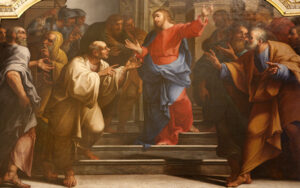
John 8:46-59:
46 Which of you convicts me of sin? If I tell the truth, why do you not believe me? 47 He who is of God hears the words of God; the reason why you do not hear them is that you are not of God.” 48 The Jews answered him, “Are we not right in saying that you are a Samaritan and have a demon?” 49 Jesus answered, “I have not a demon; but I honor my Father, and you dishonor me. 50 Yet I do not seek my own glory; there is One who seeks it and he will be the judge. 51 Truly, truly, I say to you, if any one keeps my word, he will never see death.” 52 The Jews said to him, “Now we know that you have a demon. Abraham died, as did the prophets; and you say, ‘If any one keeps my word, he will never taste death.’ 53 Are you greater than our father Abraham, who died? And the prophets died! Who do you claim to be?” 54 Jesus answered, “If I glorify myself, my glory is nothing; it is my Father who glorifies me, of whom you say that he is your God. 55 But you have not known him; I know him. If I said, I do not know him, I should be a liar like you; but I do know him and I keep his word. 56 Your father Abraham rejoiced that he was to see my day; he saw it and was glad.” 57 The Jews then said to him, “You are not yet fifty years old, and have you seen Abraham?” 58 Jesus said to them, “Truly, truly, I say to you, before Abraham was, I am.” 59 So they took up stones to throw at him; but Jesus hid himself, and went out of the temple.
This passage is remarkable, especially when viewed as part of the entire chapter, in the way that it ratchets up the tension in the back-and-forth dialogue between Jesus and the Jews. You can feel how they are digging with each question, incredulous at the things Jesus is saying but also hoping he would say something to give them a reason to kill him.
Matthew is more explicit in its linking of Jesus as the new Jeremiah, where it cites Jeremiah 31:15 in Matthew 2:17-18, or where the people themselves say that Jesus is Jeremiah or one of the prophets. John, meanwhile, makes comparisons by showing events in the narrative itself, allowing the reader to draw conclusions. Here is a table showing some comparisons just within the short passage.
| John 8:46–59 (NT) | Jeremiah (OT) |
|---|---|
| Jn 8:46-47: “Which of you convicts me of sin? If I tell the truth, why do you not believe me? He who is of God hears the words of God; the reason why you do not hear them is that you are not of God.” | Jer 26:2-3: “Thus says the Lord: Stand in the court of the Lord’s house, and speak to all the cities of Judah that come to worship in the house of the Lord; speak to them all the words that I command you; do not hold back a word. It may be that they will listen, all of them, and will turn from their evil way, that I may change my mind about the disaster that I intend to bring on them because of their evil doings.” |
| Jn 8:47: “…the reason why you do not hear them is that you are not of God.” | Jer 5:30–31: “An appalling and horrible thing has happened in the land: the prophets prophesy falsely, and the priests rule as the prophets direct.” |
| Jn 8:48: The Jews answered him, “Are we not right in saying that you are a Samaritan and have a demon?” | Jer 29:26-27: “‘The Lord has made you priest instead of Jehoiada the priest, to have charge in the house of the Lord over every madman who prophesies, to put him in the stocks and collar. Now why have you not rebuked Jeremiah of Anathoth who is prophesying to you?’” |
| Jn 8:58: Jesus said to them, “Truly, truly, I say to you, before Abraham was, I am.” | Jer 1:5: “Before I formed you in the womb I knew you, and before you were born I consecrated you…” |
| Jn 8:59: “So they took up stones to throw at him…” | Jer 26:7-8: “The priests and the prophets and all the people heard Jeremiah speaking these words in the house of the Lord. And when Jeremiah had finished speaking all that the Lord had commanded him to speak to all the people, then the priests and the prophets and all the people laid hold of him, saying, ‘You shall die!’” |
| Jn 8:59: “So they took up stones to throw at him; but Jesus hid himself, and went out of the temple.” | Jer 26:24: “But the hand of Ahikam son of Shaphan was with Jeremiah so that he was not given over into the hands of the people to be put to death.” |
It is interesting that they call him a Samaritan. Saint Cyril of Alexandria speculated that it was because the Samaritans did not practice a strict form of Judaism because of their mixture of pagan customs. Jesus appeared indifferent to the commands of the Law and had his disciples break the Sabbath. Another possible reason is that the Samaritans would often attest to their own purity but refrain from contact with the Jews because they falsely believed them to be impure. The irony was that in the case of Jesus, he was condemning them from a standpoint of actual purity.5)Cyril of Alexandria, Commentary on the Gospel of John, in Ancient Christian Commentary on Scripture: New Testament IVa, John 1–10, ed. Joel C. Elowsky, gen. ed. Thomas C. Oden (Downers Grove, IL: InterVarsity Press, 2015), 8. The ideas of Samaritans and idol worship were tied intimately together in Jewish thought, and idols were seen as representing demons.
Saint Cyril of Alexandria, 375 AD – 444 AD
“So he ingeniously says, ‘I do not have,’ thereby transferring the statement to them, as it were, and ascribing it to them instead, since that is truly how it is. ‘I do not have a demon,’ he says (but you do). And ‘I honor my Father’ when I say that he is my God and I have come from God and when I further maintain that I do not know how to sin. For the one who is from God must—must, I say—be God. And he who comes from the one who cannot sin must be recognized to be of the same kind as the one from whom he comes. The opposite would have to be the case as well. (I am using circumspect language to avoid offending you.) That is, God would not be honored if he were thought to have a Son who is not God. The Father would not be honored, he says, if he were called the Father of one who falls into sin. Therefore, when I testify about my excellent qualities, I am not at all blaspheming as you suppose, he says; rather, I am honoring the one who begat me.”6)Cyril of Alexandria, Commentary on John, Volume 2, ed. Joel C. Elowsky, trans. David R. Maxwell, Ancient Christian Texts (Downers Grove, IL: InterVarsity Press, 2015), 8.
“Look! Look at the way they defend themselves and imply that they have not falsely railed against him. Their response convicts them as liars all the more, and they are bound even more tightly in the cords of their own sins, as it were. In utter folly, they say here, ‘Now we know.’ They who often barked at him and claimed he had a demon say, ‘Now we know,’ thus condemning their previous unbridled tongues. After all, if they know now, then they didn’t know before. How then could they claim he had a demon when they themselves thought he was not yet liable to accusation? Therefore, the irreverent people of the Jews were previously lying, and with unguarded mouths they were belching up the devil’s malice against Christ.”7)Cyril of Alexandria, Commentary on John, Volume 2, 12.
They float out the question about Abraham to attempt to get Jesus to admit to some kind of blasphemy and be eligible for stoning, and yet at the same time it’s a bit amazing that they can’t quite wrap their heads around what exactly he seems to be claiming.8)George R. Beasley-Murray, John, vol. 36 of Word Biblical Commentary, ed. David A. Hubbard and Glenn W. Barker (Waco, TX: Word Books, 1987), 137. Jesus is making a clear statement to us, with the hindsight of 2000 years of Christian tradition, but to the Jews of the day he seems to be hinting at something like Divinity, with a potentially blasphemous statement in the words “I am.” Whether or not he was actually claiming to be Yahweh would most likely not stand up in court, even if everyone knew what he meant, and indeed it did not:
Acts 13 27-28:
27 Because the residents of Jerusalem and their leaders did not recognize him or understand the words of the prophets that are read every sabbath, they fulfilled those words by condemning him. 28 Even though they found no cause for a sentence of death, they asked Pilate to have him killed.
Finally, we have our passage in Hebrews, which ties all of our readings together.
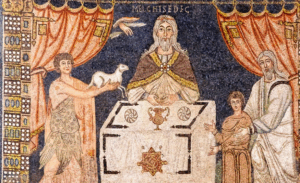
Hebrews 9:11-15:
11 But when Christ appeared as a high priest of the good things that have come, then through the greater and more perfect tent (not made with hands, that is, not of this creation) 12 he entered once for all into the Holy Place, taking not the blood of goats and calves but his own blood, thus securing an eternal redemption. 13 For if the sprinkling of defiled persons with the blood of goats and bulls and with the ashes of a heifer sanctifies for the purification of the flesh, 14 how much more shall the blood of Christ, who through the eternal Spirit offered himself without blemish to God, purify your conscience from dead works to serve the living God. 15 Therefore he is the mediator of a new covenant, so that those who are called may receive the promised eternal inheritance, since a death has occurred which redeems them from the transgressions under the first covenant.
In the main Greek manuscripts, the first word of this passage is Χριστός or Christ. According to literary structure that word is the exact center and fulcrum of the entire epistle to the Hebrews. The whole argument of the book has been building to this point.9)Paul Ellingworth, The Epistle to the Hebrews, New International Greek Testament Commentary (Grand Rapids: Eerdmans, 1993), 43. Before, we had Jeremiah hiding the Tabernacle until the time of the gathering of the tribes under the messiah. Now, we have Jesus as the heavenly Tabernacle taking our sacrifice into the Holy Place to restore our relationship with God.
There has been a heated debate among scholars and Biblical commentators about how to interpret verse 11, particularly the portion in bold:
“11 But when Christ appeared as a high priest of the good things that have come, then through the greater and more perfect tent (not made with hands, that is, not of this creation)…”
There are many potential viewpoints but the two strongest ones are based on the meaning of the word “through,” which in turn changes the entire meaning of the passage. In the Greek, διά is the word used, and so it could mean one of two things. In the first meaning, “through” is taken locally, in the sense of Jesus went through a greater and more perfect tent spatially, from point A to point B in the same way someone goes through a door. If we follow this interpretation, the logic is as follows: The Tabernacle (the same word σκηνή is used for Tabernacle and tent), was built by Moses, who patterned it off a heavenly vision of the worship in heaven. The earthly tabernacle had multiple sections and was a shadow of the more perfect, heavenly tabernacle.
This can get a bit confusing because of how the Greek is translated. In the earthly tabernacle there was the first tent, called the Holy Place. The problem is that this word is translated from the Greek Ἅγια, which can mean Holy Place (the first room), Holy of Holies (the second room) , or even holy things. It’s a broad term for holy things that happens to have a specific meaning for the first room. For instance Saint Paul uses the generic word Ἅγια, Holy Place, in verse 12 even though he intends the particular meaning of Holy of Holies. The Greek words Ἅγια Ἁγίων mean specifically Holy of Holies or Most Holy Place, and refer only to the second room. I will only refer to the second room as Holy of Holies to avoid confusion. Likewise, the heavenly Tabernacle has multiple compartments. When Jesus is finally able to enter the Holy of Holies on our behalf, it is by passing through the initial “more perfect Tabernacle” in heaven to then enter the Holy of Holies.
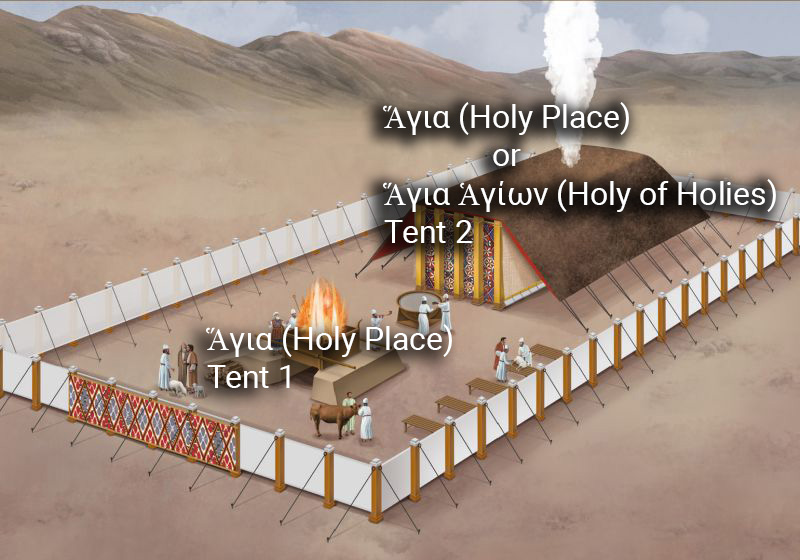
The second interpretation is based on the Greek word διά as being instrumental, or meaning “by means of.” In this case, the logic is as follows: Jesus “by means of” his resurrected body is a “more perfect tabernacle” that was able to enter the Holy of Holies. Heaven may have different parts, but Saint Paul is not focused on this as his main point.
Both of these interpretations have strong arguments for them, and the first question someone might ask is why does any of this nerdy technical stuff matter? Because verse 11 is the entire point of Hebrews, and to get it wrong means you will miss the message. In this case, I will show that the interpretation has the Eucharist in mind. So let’s look at some of the evidence for and against.
In support of the first position, is that Saint Paul does refer in different places of the Bible to multiple parts of heaven. To me, the strongest argument is that the structure of the passage itself points to this meaning, at least at first glance. In this structural argument, Hebrews 9 builds by first going over the Old Testament worship and where it took place, and then the means by which it forgave sins. You can see this in the table below.
Hebrews 9:
Saint Paul then takes the Old Testament and contrasts it to the New Covenant in Christ in our passage Hebrews 9:11-12. According to this argument, you can see the same structure in the New Covenant comparison. Below the table presents verses 11-12 in a chiastic pattern like you would find in poetry. A section repeats itself in reverse order so that it forms a mirror image of itself. One such example could be a-b-b-a. The one below follows an a-b-b-c-c-d form, with two negative statements at the center.
Hebrews 9:11-12:
| a | But Christ, arriving as the high priest of the good things to come, | |
| b | through the greater and more perfect tent | Concerned with place of worship (Where) |
| b neg | Not made with hands, that is, not of this creation, | Concerned with place of worship (Where) |
| c neg | and not through blood of goats and calves, | Concerned with means of approach
(How) |
| c | but through his own blood | Concerned with means of approach
(How) |
| d | entered once for all into the sanctuary in finding an eternal redemption |
The logic of this argument then, is that of the two possible meanings of the Greek, Saint Paul must mean that Jesus passed “through” in the spatial sense, because it takes place in the “where” part of the argument.10)The previous two tables were developed to explain this argument, described in William L. Lane, Hebrews 9–13, Word Biblical Commentary 47B (Dallas: Word Books, 1991), 237. It’s a solid argument and gives me something to think about. It’s also crap.
For one, the Church Fathers in both the East and West say that it refers to the body of Christ, and protestant commentators even admit that.11)Ibid. That should be the end of the argument, but protestants do seem to like to play exegetical patty cake games to read the text as they see fit. Tradition should guide our interpretation, and when a Doctor of the Church speaks on an exegetical manner we should use that to guide our exegesis.
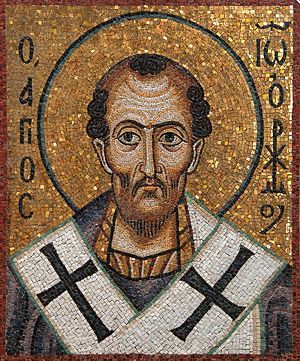
Saint John Chrysostom, 347 AD – 407 AD
“Well did he say, ‘greater and more perfect tent,’ since God the Word and all the power of the Spirit dwells therein, ‘for it is not by measure that he gives the Spirit.’ ‘More perfect,’ as being both without blame and setting right greater things. ‘That is, not of this creation’—see how it was greater, for it would not have been ‘of the Spirit,’ if humankind had constructed it. Nor yet is it ‘of this creation,’ that is, not of these created things, but spiritual, of the Holy Spirit. See how he calls the body tent and curtain and heaven: ‘Through the greater and more perfect tent.’; Through the curtain, that is, through his flesh.’16 And again, ‘into the inner shrine behind the curtain.’17 And again, ‘entering into heaven itself, now to appear in the presence of God.’ Why then does he say this? In accordance with whether one thing or another is signified. I mean, for instance, the heaven is a curtain, for as a curtain it walls off the Holy of Holies; the flesh is a curtain hiding the Godhead; and the tent likewise holds the Godhead. Again, heaven is a tent, for the priest is there within.”12)John Chrysostom, Homilies on Hebrews, quoted in Hebrews, ed. Erik M. Heen and Thomas C. Oden, vol. 10 of Ancient Christian Commentary on Scripture: New Testament (Downers Grove, IL: InterVarsity Press, 2005), 139-140.

Saint Theodoret of Cyrrhus, 393 AD – 458 AD
“Here he referred to human nature, which Christ the Lord assumed. It was not made in accordance with the law of marriage: the all-holy Spirit was responsible for the Tabernacle.”13)Ibid., 138.
I am very sympathetic to wanting to read the heavenly Tabernacle as corresponding to the earthly Tabernacle, because Moses created the Tabernacle to correspond to the heavenly Tabernacle to begin with. But there is a deadly flaw in this argument. Let’s look at chapter 9 with new eyes.
Hebrews 9:6-9
6 These preparations having thus been made, the priests go continually into the outer tent, performing their ritual duties; 7 but into the second only the high priest goes, and he but once a year, and not without taking blood which he offers for himself and for the errors of the people. 8 By this the Holy Spirit indicates that the way into the sanctuary is not yet opened as long as the outer tent is still standing 9 (which is symbolic for the present age).
Now look back at verse 11
11 But when Christ appeared as a high priest of the good things that have come, then through the greater and more perfect tent (not made with hands, that is, not of this creation)
When Christ died, the outer tent is no longer standing, otherwise he would not be able to act as high priest to begin with. It would run completely contrary to Saint Paul’s argument to have a “new and better tent” exist up in heaven based on an obsolete concept on earth. The point is that there is no first section anymore. Jesus mediates directly in the Holy of Holies, because the time of the Messiah is the beginning of the age to come, not the present age.
A final fatal flaw of the idea of the first tent being equal to the heavens, is that Hebrews 9:11 says the following: “then through the greater and more perfect tent (not made with hands, that is, not of this creation).” But notice what it says elsewhere:
Hebrews 1:10:
10 And, “Thou, Lord, didst found the earth in the beginning, and the heaven are the work of thy hands…”
Acts 7:48-50:
48 Yet the Most High does not dwell in houses made with hands; as the prophet says,
49 ‘Heaven is my throne,
and earth my footstool.
What house will you build for me, says the Lord,
or what is the place of my rest?
50 Did not my hand make all these things?’
The interpretation of the first tent as an uncreated part of heaven is incorrect because heaven itself is created. Other problems include the fact that the first tent is more perfect because it was heavenly, but that would entail that the Holy of Holies is more perfect as well. And yet even though access to the Holy of Holies in heaven is the main point of Saint Paul’s argument, he spoke of the minor outside tent as being more perfect, with no parallel mention of the Holy of Holies in heaven being a more perfect version of the Holy of Holies from the Tabernacle.
It’s structurally unbalanced; it places a unique focus on a part of heaven that he is moving through, when the focus is on where he is moving to. There is no such emphasis in Hebrews 9:1-10 of the high priest moving through the first tent to get to the Holy of Holies, and yet since verses 1-10 build to a “more perfect tent” in verse 11, verses 1-10 should at least have focused on moving through the first tent in the Old Covenant to start with. If you don’t initially highlight moving through the first tent in the Old, you can’t coherently highlight it as moving through a “more perfect” first tent in heaven. Lastly, Saint Paul himself uses the broader Greek word Ἅγια for the second room of the Holy of Holies in Hebrews 9:12, calling it the generic Holy Place. This seems to mean that Saint Paul isn’t particularly worried about the exact two-part geography of a heavenly version of the Tabernacle, and using the corresponding specific terminology. He uses the generic Holy Place word because he isn’t concerned with the exact sequence of moving through the rooms that this interpretation requires.14)Ellingworth, The Epistle to the Hebrews, 45. There are other issues, but these should suffice. This interpretation is done, as should be any such interpretation that knowingly strays from the Church Fathers.
Tent as Body of Christ
Let’s return to Hebrews 9:11-12 and take another look at the structure to point out what the previous argument seems to miss.
Hebrews 9:10-12:
| a | But Christ, arriving as the high priest of the good things to come, | |
| b | through the greater and more perfect tent | Means of
entrance |
| b neg | Not made with hands, that is, not of this creation, | |
| c neg | and not through blood of goats and calves, | |
| c | but through his own blood | Means of entrance |
| d | entered once for all into the sanctuary in finding an eternal redemption |
There is a strong parallelism between “tent,” and “blood,” and both of them are related to how Jesus enters into the Holy of Holies, using the exact same Greek word διά, or through, repeated for both. The word tent, or σκηνή in Greek, has the definite article and so it is an already known tent that his readers would be familiar with. We can make quite a bit of sense out of the cryptic reference to tent when we consider that “blood” corresponds to Christ’s body, and Jesus’s resurrected body was “not made by hands.”15)This line of thought is taken largely from James Swetnam, “The Greater and More Perfect Tent: A Contribution to the Discussion of Hebrews 9:11,” Biblica 47, no. 1 (1966): 91–106, https://www.jstor.org/stable/43595477.
Mark 14:58:
58 “We heard him say, ‘I will destroy this temple that is made with hands, and in three days I will build another, not made with hands.’”
The view of Christ’s body as being “uncreated” is one of the chief attacks on this interpretation, and indeed many heretics tried to point to this passage to prove that Jesus was not truly man.16)Philip Edgcumbe Hughes, A Commentary on the Epistle to the Hebrews (Grand Rapids, MI: William B. Eerdmans Publishing Company, 1977), 284.But we do not base our interpretations on the misunderstandings of heretics. I refer you to the Fathers I cited above that touched on this issue already. We do not speak of his earthly body prior to the cross, but we speak of his resurrected body, which is heavenly, as 1 Corinthians 15:47 states. Flesh and blood cannot inherit the Kingdom of God, and so he needed a “more perfect” body as the “more perfect” tent.
And this is a crucial point: Seeing the new tent as Christ’s body helps explain how Christ is supposed to move through the tent and enter in the Holy of Holies once and for all, and yet also still be minister of the tent.
Hebrews 8: 1-2:
Now the point in what we are saying is this: we have such a high priest, one who is seated at the right hand of the throne of the Majesty in heaven, 2 a minister in the sanctuary and the true tent which is set up not by man but by the Lord.
The syntax of the Greek entails that the tent and the Holy of Holies are separate entities.17)Lane, Hebrews 9–13, 238. The false interpretation earlier would have trouble explaining this. How can you pass through the tent, enter the Holy of Holies only once, but still be minister of the first tent as well? And yet if the new tent is Christ as resurrected body, it is the most natural thing in the world to minister his own body as sacrifice.
Hebrews 10:19-20:
19 Therefore, brethren, since we have confidence to enter the sanctuary by the blood of Jesus, 20 by the new and living way which he opened for us through the curtain, that is, through his flesh.
In the above, his blood and flesh are linked, just as in our original passage in Hebrews 9:11-12, the blood and tent are linked. We even have the curtain imagery to make the link more concrete. And if we have the flesh and blood of our Lord in view, this brings about a Eucharistic interpretation as well.
The Eucharist
We have the passage of 9:11-12 in Hebrew taking place on the Day of Atonement, since this is the one time of the year when the earthly high priest was able to enter into the Holy of Holies. The Day of Atonement was about the forgiveness of sins, and this is at the forefront of Saint Paul’s mind as he writes.
With the context of forgiveness of sins as the backdrop, we also have a comparison of the Old and the New covenants, but with Saint Paul changing the words of Moses to the words of Jesus at the Last Supper.
Notice the original words of Moses:
Exodus 24:8:
8 And Moses took the blood and threw it upon the people, and said, “Behold the blood of the covenant which the Lord has made with you in accordance with all these words.”
Now note the words of Jesus at the last supper:
Matthew 26:28:
28 for this is my blood of the covenant, which is poured out for many for the forgiveness of sins.
When Saint Paul refers to Moses, note that instead of citing the original words, he cites the words of institution of the Eucharist in Matthew:
Hebrews 9:18-20:
18 Hence even the first covenant was not ratified without blood. 19 For when every commandment of the law had been declared by Moses to all the people, he took the blood of calves and goats, with water and scarlet wool and hyssop, and sprinkled both the book itself and all the people, 20 saying, “This is the blood of the covenant which God commanded you.”
Institution words are formal and have a structure. Such a change might seem small, but when you note that in Matthew the context is the forgiveness of sins, then see that against the Day of Atonement backdrop Saint Paul uses the words of institution, it is much harder to deny. The context of forgiveness of sins is what makes Saint Paul cite the words of institution, drawing you into the mystery that the Eucharist is the new and better sacrifice contrasted with those of the Old Covenant.
Liturgical Meaning
Jesus is the new Jeremiah, and he was persecuted even more than Jeremiah was. The purpose of his persecution however, was to die and rise again, so that through his newer and better Tabernacle he could minister the blood of the New Covenant for the forgiveness of sins. It’s helpful to read through the book of Revelation and see the heavenly liturgy.
Revelation 5:6-10
6 And between the throne and the four living creatures and among the elders, I saw a Lamb standing, as though it had been slain, with seven horns and with seven eyes,[b] which are the seven spirits of God sent out into all the earth; 7 and he went and took the scroll from the right hand of him who was seated on the throne. 8 And when he had taken the scroll, the four living creatures and the twenty-four elders fell down before the Lamb, each holding a harp, and with golden bowls full of incense, which are the prayers of the saints; 9 and they sang a new song, saying,
“Worthy art thou to take the scroll and to open its seals,
for thou wast slain and by thy blood didst ransom men for God
from every tribe and tongue and people and nation,
10 and hast made them a kingdom and priests to our God,
and they shall reign on earth.”
Jesus reigns in heaven eternally presenting his sacrifice, and we also see that just like in the passage of Jeremiah with the heavenly cauldron, heavenly events in the New Jerusalem have earthly consequences. We should expect to see these similarities, since in both cases Jeremiah and Revelation are referring to the destruction of the Temple.
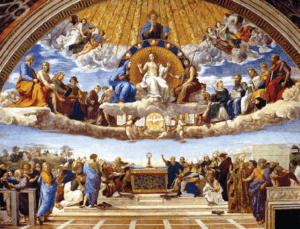
Revelation 16:1-2:
Then I heard a loud voice from the temple telling the seven angels, “Go and pour out on the earth the seven bowls of the wrath of God.” 2 So the first angel went and poured his bowl on the earth, and foul and evil sores came upon the men who bore the mark of the beast and worshiped its image.
As we go through our Lenten journey, we will face persecution like any of the prophets, as well as Jesus himself. We need to stay on our spiritual path, because ultimately the events on earth are affected by the spiritual, not vice versa. Getting sucked off our spiritual journey and involving ourselves with the ways of the world is playing with shadows. And if doing works of God invited persecution and ultimately brought about the salvation of the world as well as the punishment of the wicked, so can our own battles when we offer them in union with Christ through the Eucharist.
References
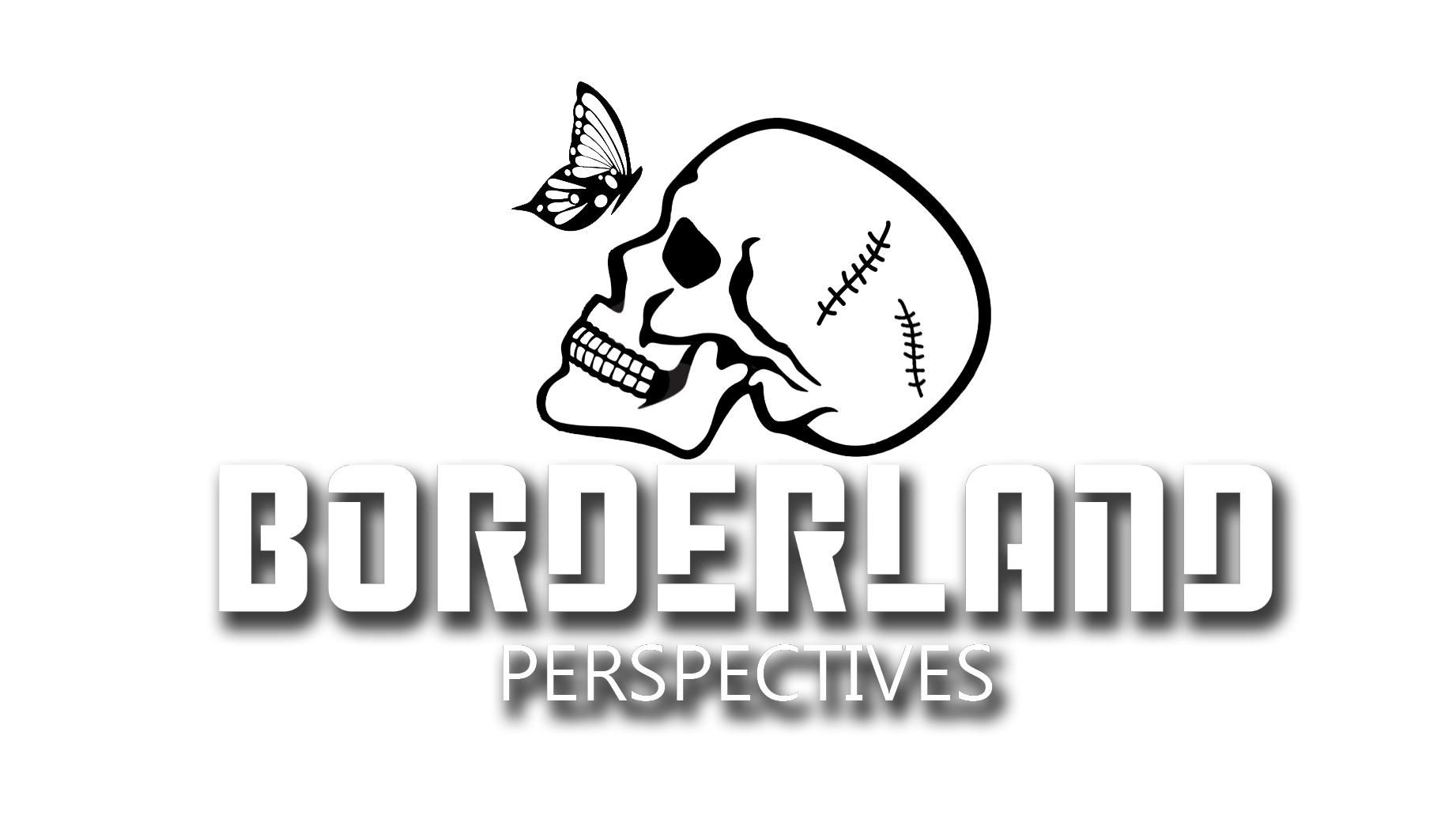
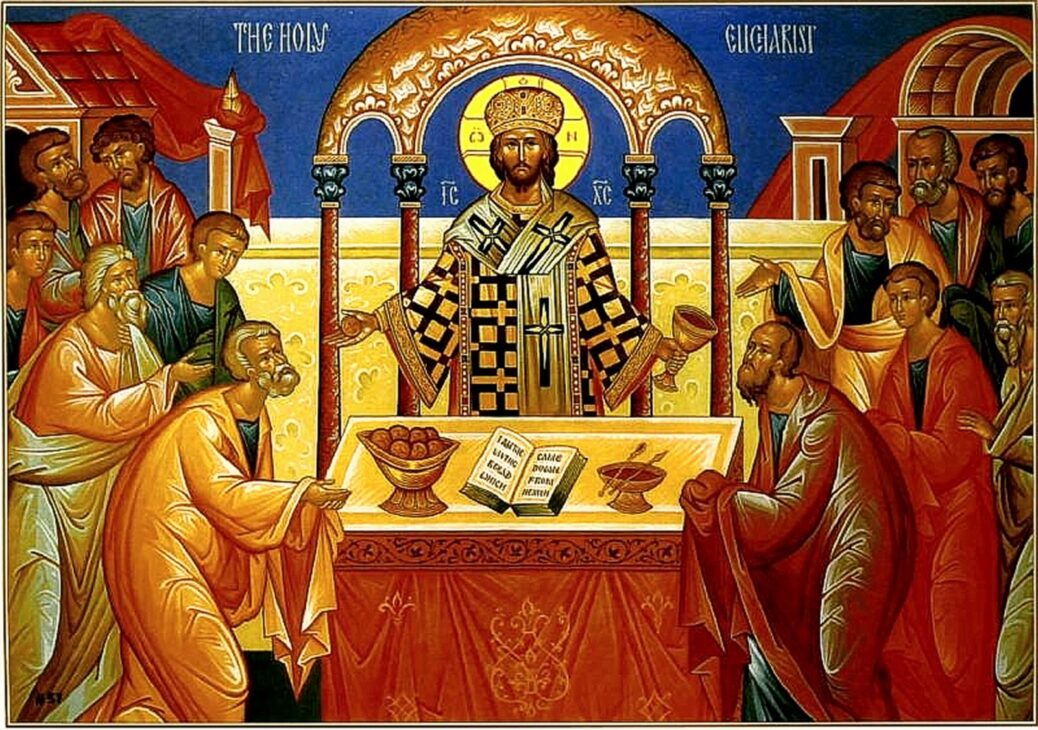
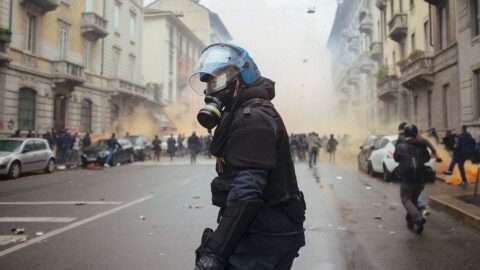
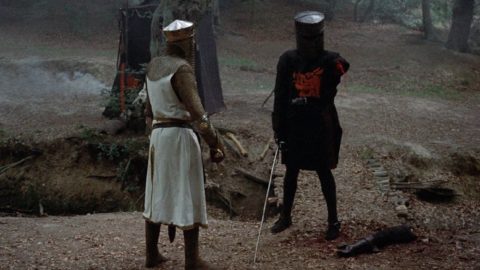
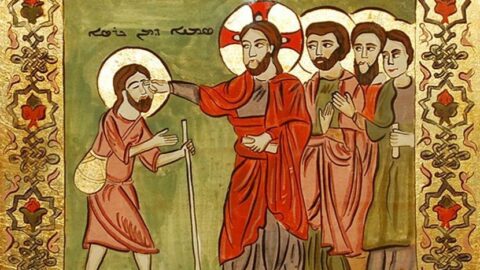

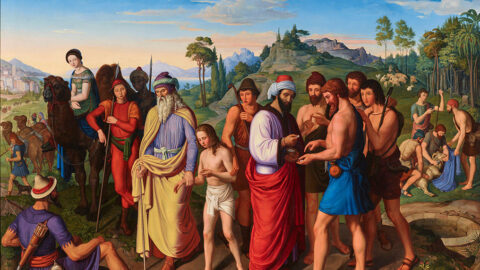
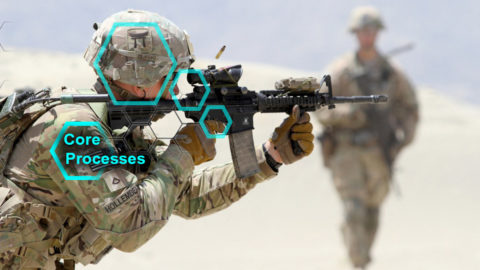
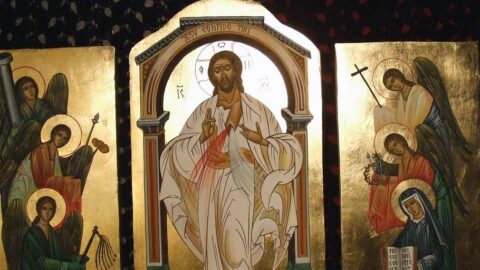

 Rob Brotzman
Rob Brotzman  Nathan Wagar
Nathan Wagar